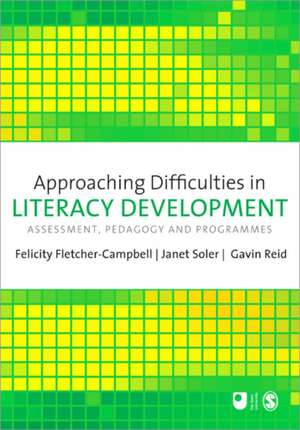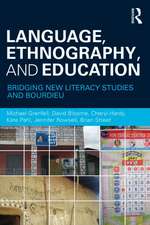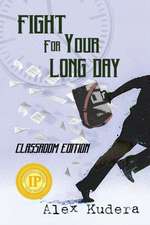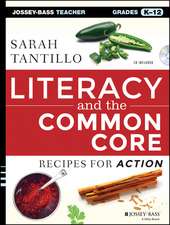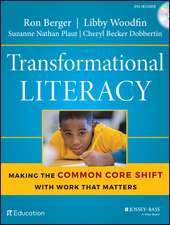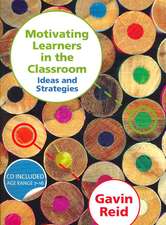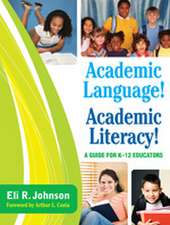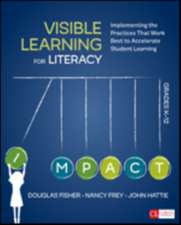Approaching Difficulties in Literacy Development: Assessment, Pedagogy and Programmes: E801 Reader
Editat de Felicity Fletcher-Campbell, Janet M Soler, Gavin Reiden Limba Engleză Paperback – 23 aug 2009
-Theoretical understandings, implications for practice
-Assessing literacy difficulties
-Pedagogy and planning
-Interventions in different contexts
This Reader is relevant to all postgraduate students of Literacy, as well as educators, professionals and policy makers.
Preț: 474.25 lei
Nou
Puncte Express: 711
Preț estimativ în valută:
90.75€ • 94.99$ • 75.53£
90.75€ • 94.99$ • 75.53£
Carte tipărită la comandă
Livrare economică 31 martie-14 aprilie
Preluare comenzi: 021 569.72.76
Specificații
ISBN-13: 9781848607712
ISBN-10: 1848607717
Pagini: 320
Dimensiuni: 170 x 242 x 18 mm
Greutate: 0.57 kg
Ediția:First Edition
Editura: SAGE Publications
Colecția Sage Publications Ltd
Seria E801 Reader
Locul publicării:London, United Kingdom
ISBN-10: 1848607717
Pagini: 320
Dimensiuni: 170 x 242 x 18 mm
Greutate: 0.57 kg
Ediția:First Edition
Editura: SAGE Publications
Colecția Sage Publications Ltd
Seria E801 Reader
Locul publicării:London, United Kingdom
Cuprins
PART ONE: THEORETICAL UNDERSTANDINGS: IMPLICATIONS FOR PRACTICE
Reading, dyslexia and the brain - Usha Goswami
Connecting early language and literacy to later reading (dis)abilities: Evidence, theory and practice - Hollis S Scarborough
Policy and research: Lessons from the Clackmannanshire Synthetic Phonics Initiative - Sue Ellis
Individual differences in the inference of word meanings from context: The influence of reading comprehension, vocabulary knowledge and memory capacity - Kate Cain, Jane Oakhill and Kate Lemmon
Impact of authentic adult literacy instruction on adult literacy practices - Victoria Purcell-Gates, Sophie C Degener, Erik Jacobson and Marta Soler
PART TWO: ASSESSING LITERACY DIFFICULTIES
Is the PhAB really fab? The utility of the phonological assessment battery in predicting gains made by older low-progress readers following two terms of intensive literacy instruction - Kevin Wheldall and Simmone Pogorzelski
Reception class predictors of literacy skills - Jennifer Simpson and John Everatt
Principles for literacy assessment - Peter Johnston and Paula Costello
PART THREE: PEDAGOGY AND PLANNING
Dyslexia and learning style - a note of caution - Tilly Mortimore
Mapping a pedagogy for Special Education Needs - Brahm Norwich and Ann Lewis
Shaping literacy in the secondary school: Policy, practice and agency in the age of the national literacy strategy - Andy Goodwyn and Kate Findlay
Headwoman's blues: Small group reading and the interactions of culture, gender and ability - Shuaib J Meacham
PART FOUR: INTERVENTIONS IN DIFFERENT CONTEXTS
Excluded voices: Class, culture and family literacy in Scotland - Lyn Tett
Trust your own observations: Assessment of reader and tutor behaviour in learning to read in English and Maori - Ted Glynn and Stuart McNaughton
Long-term outcomes of early reading intervention - Jane Hurry and Kathy Sylva
Student writing in higher education: An academic literacies approach - Mary R Lea and Brian V. Street
PART FIVE: TRANSFORMING PRACTICE
Dyslexia and adult literacy: Does dyslexia disempower? - Hugo Kerr
Effects of the home learning environment and preschool center experience upon literacy and numeracy development in early primary school - Edward C Melhuish, Mai B Phan, Kathy Sylva, Pam Sammons, Iram Siraj-Blatchford and Brenda Taggart
Reading, dyslexia and the brain - Usha Goswami
Connecting early language and literacy to later reading (dis)abilities: Evidence, theory and practice - Hollis S Scarborough
Policy and research: Lessons from the Clackmannanshire Synthetic Phonics Initiative - Sue Ellis
Individual differences in the inference of word meanings from context: The influence of reading comprehension, vocabulary knowledge and memory capacity - Kate Cain, Jane Oakhill and Kate Lemmon
Impact of authentic adult literacy instruction on adult literacy practices - Victoria Purcell-Gates, Sophie C Degener, Erik Jacobson and Marta Soler
PART TWO: ASSESSING LITERACY DIFFICULTIES
Is the PhAB really fab? The utility of the phonological assessment battery in predicting gains made by older low-progress readers following two terms of intensive literacy instruction - Kevin Wheldall and Simmone Pogorzelski
Reception class predictors of literacy skills - Jennifer Simpson and John Everatt
Principles for literacy assessment - Peter Johnston and Paula Costello
PART THREE: PEDAGOGY AND PLANNING
Dyslexia and learning style - a note of caution - Tilly Mortimore
Mapping a pedagogy for Special Education Needs - Brahm Norwich and Ann Lewis
Shaping literacy in the secondary school: Policy, practice and agency in the age of the national literacy strategy - Andy Goodwyn and Kate Findlay
Headwoman's blues: Small group reading and the interactions of culture, gender and ability - Shuaib J Meacham
PART FOUR: INTERVENTIONS IN DIFFERENT CONTEXTS
Excluded voices: Class, culture and family literacy in Scotland - Lyn Tett
Trust your own observations: Assessment of reader and tutor behaviour in learning to read in English and Maori - Ted Glynn and Stuart McNaughton
Long-term outcomes of early reading intervention - Jane Hurry and Kathy Sylva
Student writing in higher education: An academic literacies approach - Mary R Lea and Brian V. Street
PART FIVE: TRANSFORMING PRACTICE
Dyslexia and adult literacy: Does dyslexia disempower? - Hugo Kerr
Effects of the home learning environment and preschool center experience upon literacy and numeracy development in early primary school - Edward C Melhuish, Mai B Phan, Kathy Sylva, Pam Sammons, Iram Siraj-Blatchford and Brenda Taggart
Descriere
This text show that this is necessary to accommodate the wide range of issues that can, potentially, explain literacy difficulties and suggest strategies and interventions to ease those difficulties.
